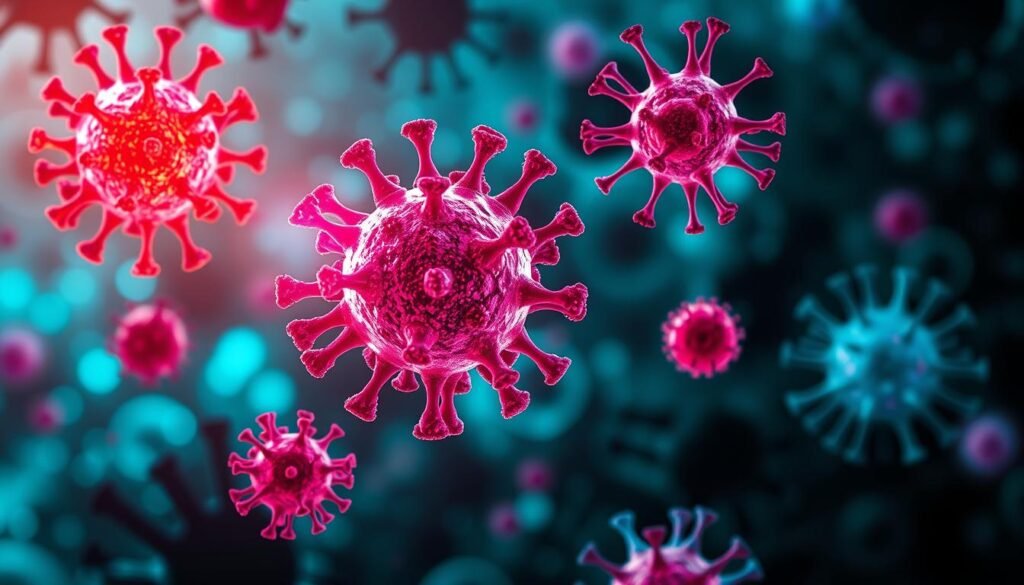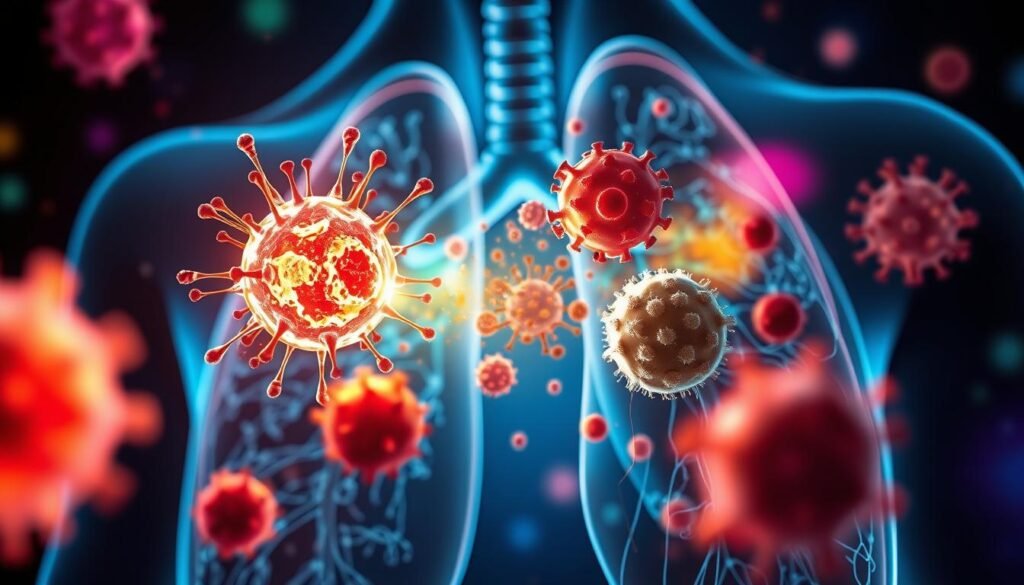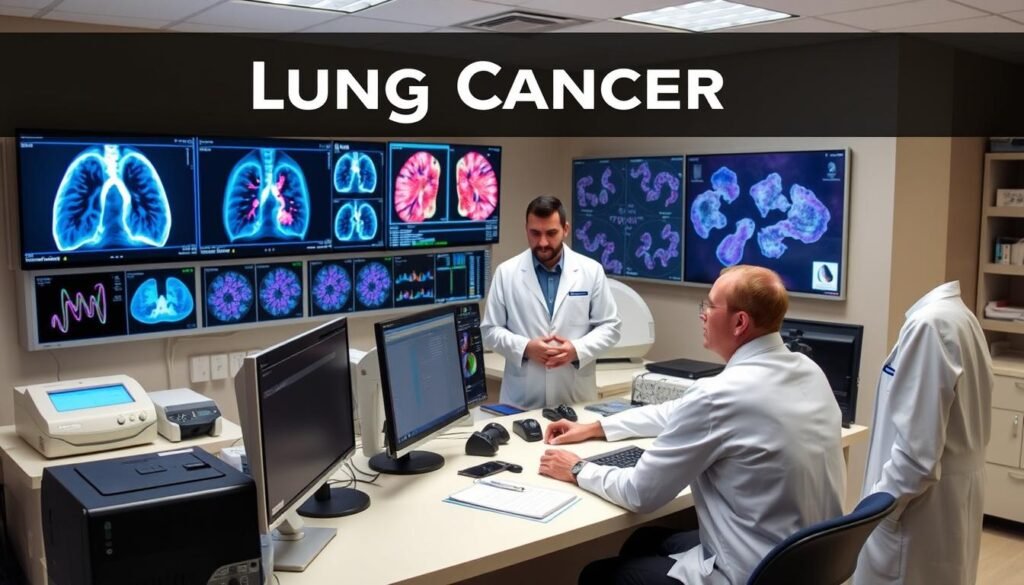Did you know over 15% of people treated with immunotherapy for lung cancer live longer? Immunotherapy has changed cancer care since its FDA approval in 2015. Especially for advanced lung cancer, it offers new hope.
The Canadian Cancer Society and the National Cancer Institute say new immunotherapy options are available for stage 4 lung cancer. These new treatments offer more than just survival—they improve people’s lives. As studies continue and tests bring positive results, patients and families feel hopeful about these treatments.
Key Takeaways
- Immunotherapy offers new hope for stage 4 lung cancer patients.
- Long-term survival is possible in over 15% of individuals treated with immunotherapy.
- FDA-approved therapies like pembrolizumab and nivolumab play crucial roles in treatment.
- Combination therapies show enhanced outcomes compared to chemotherapy alone.
- Genomic testing helps determine the best candidates for immunotherapy.
- Side effects exist but are often fewer than those associated with traditional treatments.
Understanding Stage 4 Lung Cancer
Stage 4 lung cancer is the most severe form of lung disease. It’s marked by the cancer spreading widely. There are two types: Stage 4A and Stage 4B. Stage 4A may spread to close areas or lymph nodes, while Stage 4B reaches distant parts.
Most lung cancers fall under stage IV non-small cell lung cancer (NSCLC), 85 to 90 percent of cases. Sadly, only about 8 percent survive five years after diagnosis when it spreads far. For those with small cell lung cancer, the outlook is worse. Only 3 percent make it past five years when the cancer is widespread.
Doctors use the TNM staging system to understand the cancer’s spread based on Tumor (T), Node (N), and Metastasis (M). The treatment depends on the cancer type, where it’s located, and the patient’s health. Treatments like chemotherapy, targeted therapy, and immunotherapy are tailored to fit each patient.
Dealing with stage IV lung cancer not only means fighting the disease but also managing symptoms that lower life quality. The goal is to ease pain and possibly extend life. When genetic issues are found, treatments like targeted drugs or immunotherapy are often suggested. These can work better than standard methods for some patients.
What is Immunotherapy for Lung Cancer?
Immunotherapy for lung cancer is a big step forward in how we treat cancer. It gets the body’s immune system to attack cancer cells. Unlike old treatments that attack the tumor, this method boosts the immune system. It helps it spot and kill cancer cells better.
This treatment uses something called checkpoint inhibitors. They stop certain proteins from interacting, helping the immune system find and destroy lung cancer cells. Many patients’ tumors have stopped growing for over three years. This shows how promising immunotherapy is for advanced lung cancer.
Immunotherapy drugs for lung cancer are mostly given by IV infusion. This happens every two to four weeks. Though side effects are like those of chemotherapy, they tend to be less harsh. This makes immunotherapy a good choice in fighting lung cancer.
Researchers are also looking at new treatments like therapeutic cancer vaccines and adoptive T cell therapy. Even though there’s no FDA-approved vaccine for lung cancer yet, these studies could lead to better treatments. Tweaking T cells to fight cancer better is especially exciting.
Who gets immunotherapy depends on the lung cancer type, mutations, and overall health. Treatments are picked based on what’s best for each patient. More research is showing how well immunotherapy works for serious lung cancer. This is changing the future of cancer care. For more about immunotherapy for lung cancer, check out Care Your Lungs.
Immunotherapy Lung Cancer Stage 4
Immunotherapy is changing the way we treat stage 4 lung cancer. It uses the body’s own immune system to fight cancer. This is especially important when chemotherapy doesn’t work well. Immunotherapy targets the immune system to help beat cancer, improving survival and life quality.
How Immunotherapy Works in Treating Stage 4 Lung Cancer
This treatment changes how the immune system sees cancer cells, making it better at attacking them. One method combines a JAK1 inhibitor with anti-PD1 immunotherapy. This mix has an impressive 67% success rate in treating advanced lung cancer. It also extends the time patients live without their cancer getting worse to about 24 months.
Types of Immunotherapy for Lung Cancer
Different immunotherapy methods are used for stage 4 lung cancer. Each has its own way of improving treatment. Some examples include:
- Checkpoint inhibitors, which boost the immune fight against tumors.
- Anti-PD-1 and anti-PD-L1 therapies, that stop proteins from blocking immune attacks on cancer.
- Combination therapies, that use various immunotherapies together for better results.
The National Comprehensive Cancer Network recommends using these advanced lung cancer treatments. It’s crucial to choose the right therapy based on the patient’s unique situation.
Types of Immunotherapies Used in Stage 4 Lung Cancer
Today’s stage 4 lung cancer treatments have improved thanks to immunotherapy. These methods use the immune system to specifically target and fight advanced cancer. They give new hope to patients when other treatments might not work.
Checkpoint Inhibitors for Advanced Lung Cancer
Checkpoint inhibitors are key in treating advanced lung cancer. The FDA has approved three main types: PD-1 inhibitors, PD-L1 inhibitors, and CTLA-4 inhibitors. Nivolumab (Opdivo) and Pembrolizumab (Keytruda) are anti-PD-1 therapies. They focus on the PD-1 protein on immune cells, helping the body attack the tumor more effectively.
Studies have shown that patients using checkpoint inhibitors have better survival rates than those on standard chemo.
Anti-PD-1 and Anti-PD-L1 Therapies
Anti-PD-1 and anti-PD-L1 therapies are vital in lung cancer treatment. Pembrolizumab (Keytruda) and Atezolizumab (Tecentriq) are effective, especially in NSCLC and SCLC. A study in the Journal of Clinical Oncology found that 23% of NSCLC patients who hadn’t received systemic treatment before were alive five years later. In NSCLC patients who had previous treatments, 16% survived five years thanks to immunotherapy.
Combination Immunotherapy Options
Combining immunotherapy with chemotherapy is a new approach for lung cancer. It shows promise in improving outcomes. Research suggests that this combined method works better, especially for advanced cases. Adding different treatments together can enhance the immune system’s response to cancer.

| Type of Therapy | Examples | First FDA Approval |
|---|---|---|
| PD-1 Inhibitors | Nivolumab (Opdivo), Pembrolizumab (Keytruda) | Nivolumab: 03/01/2022 |
| PD-L1 Inhibitors | Atezolizumab (Tecentriq) | Not specified |
| CTLA-4 Inhibitors | Ipiimumab (Yervoy) | Not specified |
If you’re looking into immunotherapy for lung cancer, there are many resources. To learn more about how these therapies can help, click on this link.
Specific Immunotherapy Drugs and Their Uses
In the fight against lung cancer, certain drugs are crucial. They target stage 4 non-small cell lung cancer (NSCLC). These drugs boost the immune system’s fight against cancer. Here, we explore some key drugs and how they work.
Pembrolizumab (Keytruda)
Pembrolizumab is a drug that stops the PD-1 pathway. It’s used for advanced NSCLC, especially if no other treatment was given before. By doing so, it helps the immune system attack cancer cells more effectively.
Nivolumab (Opdivo)
Nivolumab works similarly to Pembrolizumab. It’s also a PD-1 inhibitor. It’s used in different situations for NSCLC, including as a first treatment and for patients at high risk. It boosts the immune system’s fight against cancer.
Atezolizumab (Tecentriq)
Atezolizumab is a PD-L1 inhibitor. It’s used for advanced NSCLC and sometimes after surgery. It’s often given with chemotherapy. This drug stops cancer cells from hiding from the immune system, leading to better outcomes for patients.
| Drug Name | Type | Indication | Mechanism of Action |
|---|---|---|---|
| Pembrolizumab (Keytruda) | PD-1 Inhibitor | Metastatic NSCLC | Blocks PD-1, enhancing immune response |
| Nivolumab (Opdivo) | PD-1 Inhibitor | Various stages of NSCLC | Enhances immune activity against tumors |
| Atezolizumab (Tecentriq) | PD-L1 Inhibitor | Metastatic and post-surgical NSCLC | Inhibits PD-L1, reactivating immune cells |
Benefits and Limitations of Immunotherapy
Immunotherapy is changing how we fight lung cancer. It offers many positives, like boosting quality of life and survival. It uses the immune system to fight cancer cells. Checkpoint inhibitors like Nivolumab (Opdivo) and Pembrolizumab (Keytruda) are especially good against non-small cell lung cancer (NSCLC). These treatments have really made a difference since they got FDA approval.
However, immunotherapy’s success varies with different patients and can be costly. Not everyone’s insurance covers it. Some treatments need to be given through the veins every few weeks. Others can be given under the skin every three weeks. This makes managing treatment complex.
Some side effects are mild, like fatigue and skin rash. Yet, some people might face serious issues involving important organs. It’s crucial to tell your cancer care team about new symptoms right away. This might mean changing the treatment plan. Despite these issues, the success stories show how important it is to have treatments that meet individual needs.

| Benefits of Immunotherapy | Limitations of Lung Cancer Treatment |
|---|---|
| Enhances immune response against cancer cells | Variable effectiveness among individuals |
| Improves overall survival rates | High treatment costs |
| Fewer side effects compared to traditional therapies | Complex treatment schedules |
| Potential for long-term remission | Possible severe autoimmune reactions |
| Broad applicability in various cancer types | Not all patients respond effectively |
Looking for more information on immunotherapy risks and benefits? Visit this resource. It helps patients and doctors decide on treatment options wisely.
Potential Side Effects of Immunotherapy Treatments
Immunotherapy has changed how we treat lung cancer. However, it comes with certain challenges. Patients and caregivers need to know about these side effects. This helps them handle them on time. Most side effects can be managed well. Health care teams watch over patients for any bad reactions. This part will talk about the side effects you might see.
Common Side Effects
Patients might see some usual side effects. These include:
- Fatigue
- Rash and skin reactions such as itchiness and redness, especially at injection sites
- Gastrointestinal issues like diarrhea and nausea
- Respiratory symptoms including coughing and difficulty breathing
- Flu-like symptoms, including fever and muscle aches
- Endocrine disorders such as hypothyroidism or adrenal insufficiency
About 20% of people on immunotherapy face immune-related side effects. These could include joint problems, like pain and swelling. Certain treatments, especially immune checkpoint inhibitors, can bring on various side effects. This shows why constant checking during treatment is key.
Serious and Autoimmune Reactions
Severe side effects might show up as autoimmune reactions. These reactions can cause big inflammation in organs. Problems might include:
- Myocarditis (heart inflammation)
- Pneumonitis (lung inflammation)
- Hepatitis (liver inflammation)
- Encephalitis (inflammation of the brain)
These conditions demand quick medical help. Some might get neurological issues like seizures or confusion. In rare cases, immunotherapy might cause inflammation in many systems at once. This means patients need careful watching all through their treatment. Dealing with side effects fast can help improve both the quality of life and treatment experience.
| Common Side Effects | Serious Autoimmune Reactions |
|---|---|
| Fatigue | Myocarditis |
| Rash and skin reactions | Pneumonitis |
| Gastrointestinal issues | Hepatitis |
| Respiratory symptoms | Encephalitis |
Clinical Trials and Emerging Research
New treatments in clinical trials for lung cancer are making big steps forward. This is really important for stage 4 lung cancer. Studies on new immunotherapy are very important. They help find new treatments to help patients live longer and better.
The National Lung Screening Trial (NLST) showed us something big. Low-dose CT scans can find lung cancer early in people 50 to 80 who smoked a lot. It’s suggested that screenings should happen regardless of when someone stopped smoking. This helps catch the cancer early.
Right now, there are over 46 clinical trials focusing on a type of lung cancer called non-small-cell lung cancer (NSCLC). A study that used machine learning was right 97% of the time in finding two types of lung cancer. This shows how tech can help doctors in their work.
New treatments like pembrolizumab (Keytruda) and nivolumab (Opdivo) are being tested. They could help patients with NSCLC after their first treatment. Alectinib (Alecensa) is another new treatment that’s now approved for use. Studies also look at drugs like osimertinib (Tagrisso) and selpercatinib (Retevmo) to see if they help patients stay cancer-free longer.

Studies like the Pragmatica-Lung Study are looking into new ways to treat lung cancer. They compare new drugs like ramucirumab (Cyramza) and pembrolizumab (Keytruda) to the usual chemotherapy. This helps find better treatments for lung cancer.
Joining a clinical trial can help move lung cancer treatment forward. It gives patients access to the newest treatments. They also help by contributing to research that can lead to better care for everyone. Things like genetic testing help doctors pick the best treatment for each person.
Looking for more info on new lung cancer treatments? Memorial Sloan Kettering Cancer Center has a lot of good information. It’s a great place to learn about the latest breakthroughs in treating lung cancer.
Current Guidelines for Treating Stage 4 Lung Cancer with Immunotherapy
The landscape for treating stage 4 lung cancer is constantly evolving. It includes new treatment guidelines immunotherapy lung cancer from top cancer groups. These guidelines focus on who can get treatment, the types of lung cancer immunotherapy protocols, and using multiple treatments together.
Who gets treatment is very important. It depends on the type of lung cancer, certain gene changes, and patient health. For example, people with changes in genes like EGFR, ALK, and ROS1 might get special treatments such as erlotinib, crizotinib, and entrectinib.
Using different therapies together often works better. Doctors might combine immunotherapy drugs like pembrolizumab, nivolumab, and atezolizumab with other treatments. This approach can lead to better results for people with a type of lung cancer called non-small cell lung cancer (NSCLC) who have certain markers.
Keeping track of how well treatment works is key. Doctors need to regularly check if the treatment is working and if it’s causing any side effects. They use scans and tests to make sure the treatment plan is still the best choice. Sticking to the recommended lung cancer immunotherapy protocols helps doctors make changes based on strong evidence.
| Drug | Indication | Combination Options |
|---|---|---|
| Pembrolizumab | Stage 4 NSCLC | Combination with chemotherapy |
| Atezolizumab | Stage 4 NSCLC | Combination with targeted therapies |
| Nivolumab | Stage 4 NSCLC | Combined therapies with radiation |
| Cemiplimab | PD-L1 positive NSCLC | Sequential treatment with chemotherapy |
As research advances, updating guidelines is crucial for better patient results in stage 4 lung cancer. Blending current treatments with new clinical trials is key to finding more ways to help patients.
Conclusion
The landscape of lung cancer treatment is changing fast because of immunotherapy, especially for stage 4 cancer. This new approach is a spark of hope for those fighting lung cancer. It shows the potential to help. With personalized treatment, patients work closely with doctors to find the best options.
Studies tell us that starting immunotherapy early may help people live longer than older treatments. Even with scary lung cancer statistics, there’s hope in immunotherapy. Knowing more about this treatment could lead to better results and more hope for advanced lung cancer.
Researchers are also looking at combining immunotherapy with other treatments. Their ongoing work aims to change lung cancer care for the better. For those facing this disease, staying updated and taking an active role in their care is crucial. It marks a big step in dealing with this tough disease.